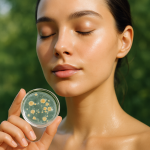
Hair fascinates me not just because I’ve dyed mine every shade from electric blue to sunset orange, but because it’s literally growing out of our heads all the time. Yet most of us know surprisingly little about how it actually works! Understanding hair growth isn’t just about fighting baldness or growing Rapunzel-worthy locks; it’s about appreciating this amazing biological process that’s happening 24/7.
Hair growth follows a complex cycle that’s influenced by everything from your genetics to what you had for breakfast. And while there’s no magic potion that’ll give you mermaid hair overnight (trust me, I’ve looked), there are science-backed approaches that can support your hair’s natural growth cycle.
The Biology of Hair Growth
Your hair grows from follicles tiny sac-like structures embedded in your scalp. Each follicle works as its own mini-factory, producing a single strand of hair through a process that’s honestly pretty wild when you think about it.
Hair growth happens in three main phases. First comes the anagen phase the active growing period that lasts 2-7 years for scalp hair. This is when cells in the follicle rapidly divide, creating the hair shaft that eventually pokes through your skin. About 85-90% of your hair is in this phase right now.
Next is the catagen phase, a short transitional period lasting about 10 days where growth stops and the follicle shrinks. Finally, there’s the telogen phase a 3-month resting period where old hairs hang out until they’re pushed out by new growth. You normally lose 50-100 telogen hairs daily, which explains that hair in your shower drain.
This cycle repeats throughout your life, though the length of each phase changes as you age. Your genetics largely determine your hair’s thickness, color, and growth rate, but other factors play significant roles too.
For instance, hormones dramatically affect hair growth. During pregnancy, many women experience thicker hair because elevated estrogen levels extend the anagen phase. After giving birth, hormone levels drop, and those extra hairs enter telogen simultaneously leading to what feels like sudden hair loss.
I learned this firsthand when my cousin freaked out about “going bald” three months after having her baby. Totally normal process, terrible timing!
Nutritional status matters too. Your hair needs protein (it’s made of keratin, after all), vitamins, and minerals to grow properly. Iron deficiency, for example, can lead to hair loss because iron helps deliver oxygen to hair follicles.
Age also impacts hair growth. As we get older, follicles shrink and produce thinner, less pigmented hairs. The anagen phase shortens, meaning hair doesn’t grow as long as it once did. This explains why your grandpa’s hair might be thinner than it was in his old photos.
Stress can trigger a condition called telogen effluvium, where a larger percentage of hairs prematurely enter the telogen phase. This leads to increased shedding 2-3 months after a stressful event. Finals week in college? Might explain that extra hair loss during summer break.
Natural Ways to Support Hair Growth
Now for the part everyone’s curious about how to actually support healthy hair growth. While I can’t promise overnight results (and anyone who does is probably trying to sell you something overpriced), these approaches have scientific backing.
Nutrition for Hair Health
Your hair needs proper nutrition to thrive. Protein is particularly important since hair is primarily made of keratin, a type of protein. If you’re not getting enough protein, your body might shut down hair growth to conserve resources for more essential functions.
Foods rich in omega-3 fatty acids support scalp health and may reduce inflammation that contributes to hair loss. Think salmon, walnuts, and flaxseeds.
Biotin (vitamin B7) has gained popularity for hair growth, and for good reason biotin deficiency can lead to hair loss. You’ll find it in eggs, nuts, sweet potatoes, and avocados.
Vitamin C helps your body produce collagen, which strengthens hair strands, while vitamin E improves scalp circulation. Zinc and iron are crucial too zinc helps with tissue growth and repair, while iron helps red blood cells deliver oxygen to your follicles.
I started taking iron supplements after a blood test showed I was deficient, and within three months, my hairdresser commented on all the new growth around my hairline. Sometimes the simplest solutions work best!
Scalp Care Practices
A healthy scalp creates the optimal environment for hair growth. Regular washing (but not over-washing) removes buildup that can clog follicles. How often you should wash depends on your hair type and lifestyle oily hair might need daily washing, while dry hair might do better with twice-weekly cleansing.
Scalp massage increases blood flow to follicles, potentially extending the anagen phase. A 2016 study found that just 4 minutes of daily scalp massage for 24 weeks increased hair thickness. Plus, it feels amazing and reduces stress double win!
Oil treatments can nourish the scalp and strengthen existing hair. Coconut oil penetrates the hair shaft to reduce protein loss, while castor oil’s antimicrobial properties may help maintain scalp health. Rosemary oil has shown promise too one study found it as effective as minoxidil (the active ingredient in Rogaine) for treating androgenetic alopecia.
My personal favorite is a DIY scalp oil blend with coconut oil, a few drops of rosemary and peppermint essential oils, and a bit of castor oil. I apply it before bed once a week, massage it in, and wash it out in the morning. My scalp feels healthier, and my hair seems stronger though the smell takes some getting used to!
Lifestyle Factors
Stress management directly impacts hair health. Chronic stress elevates cortisol levels, which can push hair into the telogen phase prematurely. Activities like yoga, meditation, or even just regular exercise can help manage stress levels.
Sleep quality affects virtually every bodily process, including hair growth. During sleep, your body releases growth hormones and repairs cells, including those in hair follicles. Aim for 7-9 hours of quality sleep nightly.
Heat styling, tight hairstyles, and chemical treatments can damage hair and stress follicles. Reducing these practices gives your hair a better chance to grow. I know it’s tough I straightened my hair daily throughout high school and definitely saw the damage. Now I limit heat styling to special occasions and use heat protectant products religiously.
Natural Remedies Worth Trying
Some natural remedies have scientific backing for hair growth. Rosemary oil, as mentioned earlier, shows promise in clinical studies. A 2015 study compared it with minoxidil and found similar results with fewer side effects.
Peppermint oil increases circulation and may stimulate follicles. A 2014 animal study showed it outperformed minoxidil in promoting hair growth.
Aloe vera contains proteolytic enzymes that repair dead skin cells on the scalp. It also acts as a great conditioner and reduces dandruff. I sometimes use pure aloe gel from my plant as a pre-shampoo treatment.
Green tea contains EGCG, a catechin that may inhibit DHT, a hormone linked to hair loss. Both drinking green tea and applying it topically might benefit hair growth.
Onion juice sounds weird (and smells worse), but a small study found it effective for patchy alopecia areata. The sulfur compounds in onions may boost collagen production. I haven’t personally tried this one I draw the line at smelling like an onion ring!
Hair growth supplements are widely available, but research on their effectiveness is mixed. Look for those containing biotin, vitamins A, C, D, E, zinc, selenium, and iron if you go this route. Always check with a healthcare provider before starting supplements, especially if you take medications.
Patience matters most when trying to stimulate hair growth. Hair grows about half an inch per month on average, and no natural remedy will transform your hair overnight. Consistency with these approaches over months not days or weeks is key to seeing results.
Hair growth science continues to evolve, with new research emerging regularly. What works for one person might not work for another due to differences in genetics, hair type, and underlying health conditions. If you’re experiencing significant hair loss, consulting a dermatologist is always wise before trying home remedies.
Understanding the natural cycle of hair growth helps set realistic expectations for what’s possible. By supporting your body’s innate processes through good nutrition, proper scalp care, stress management, and gentle handling, you give your hair the best chance to reach its full potential whatever color you decide to dye it next month.

